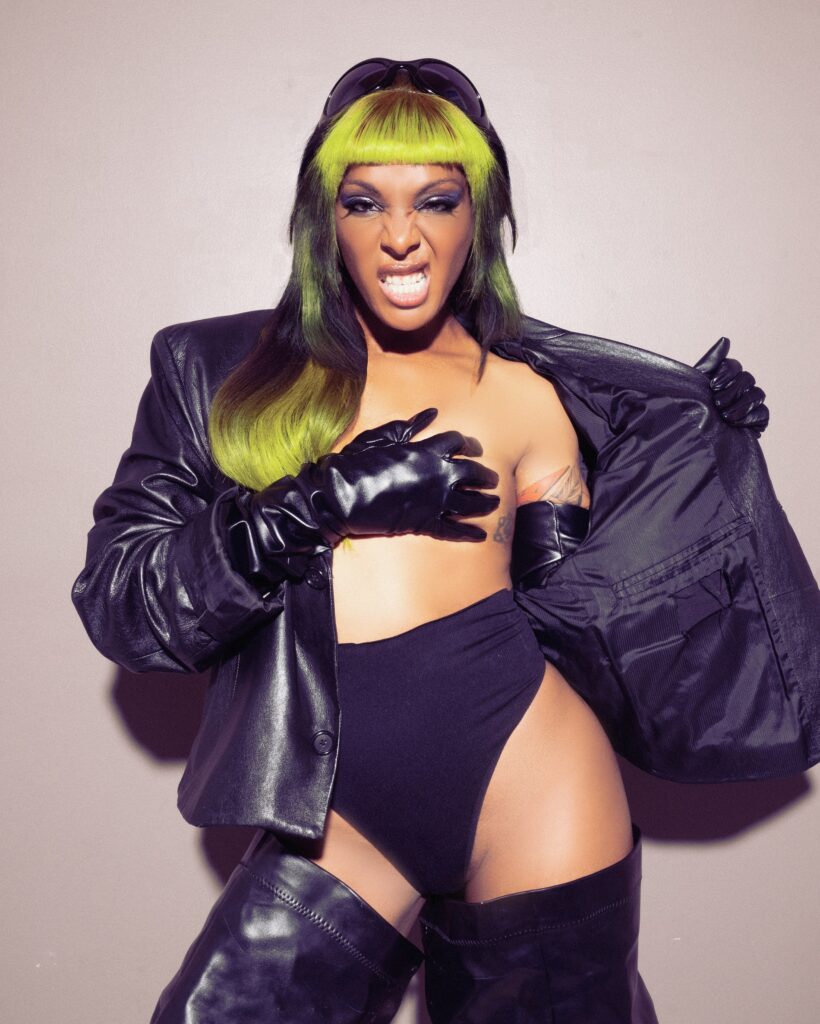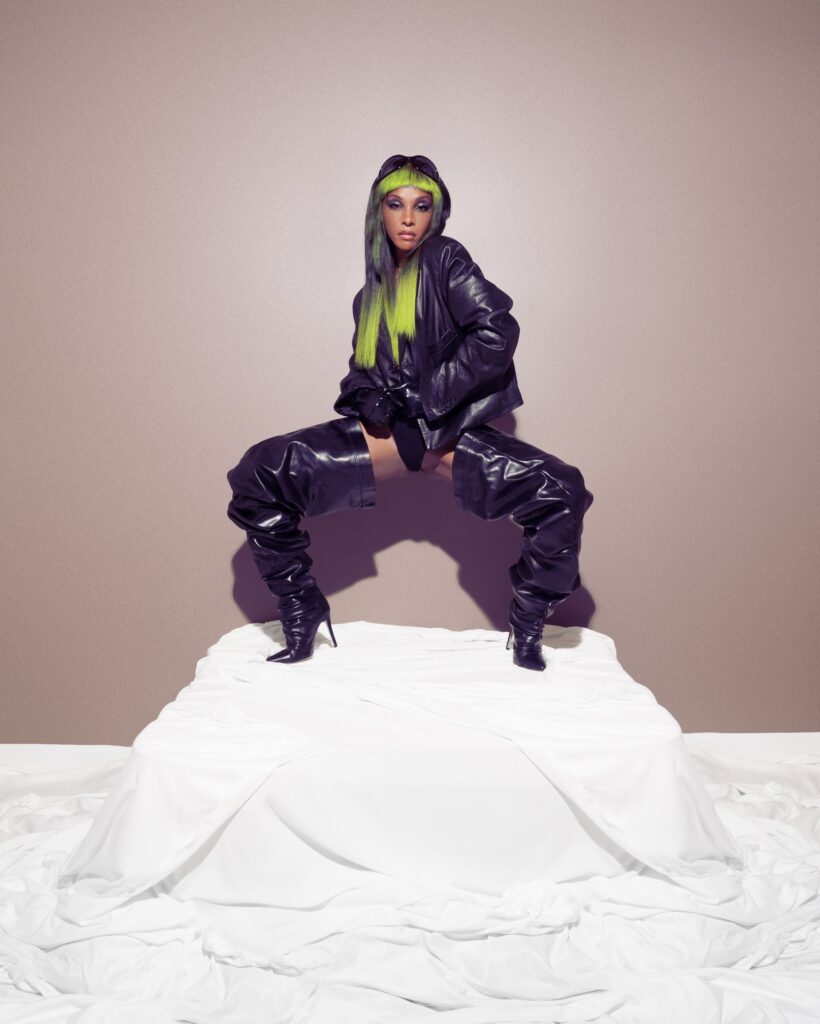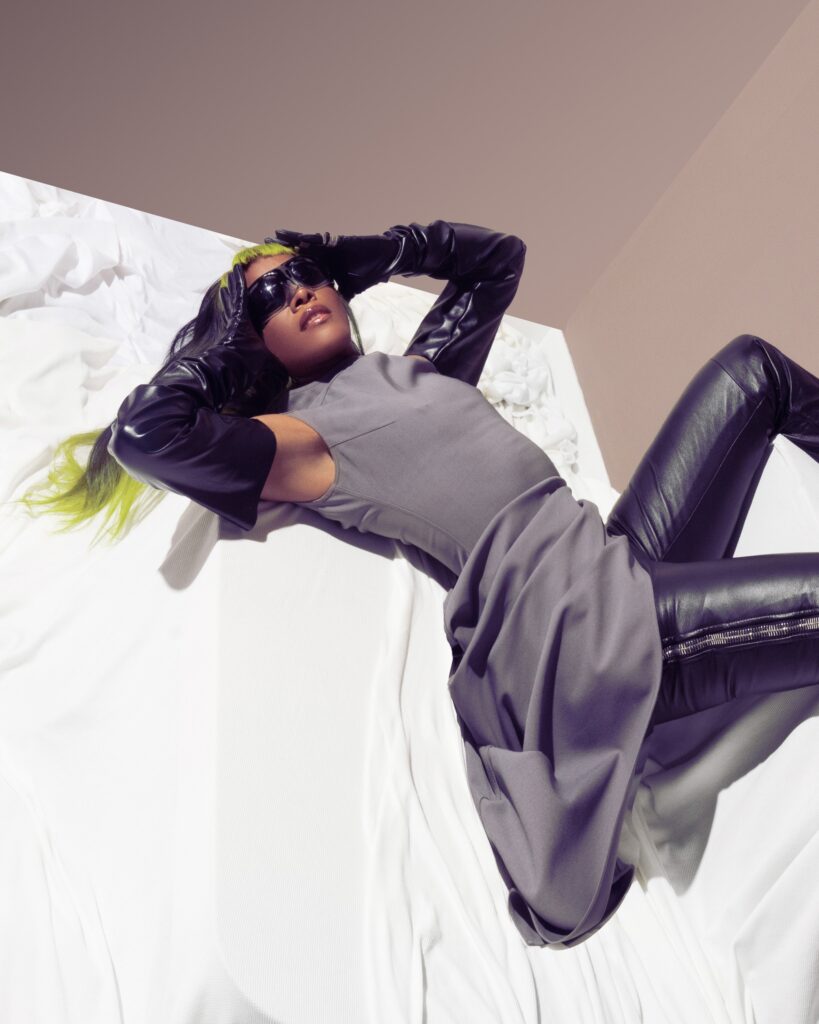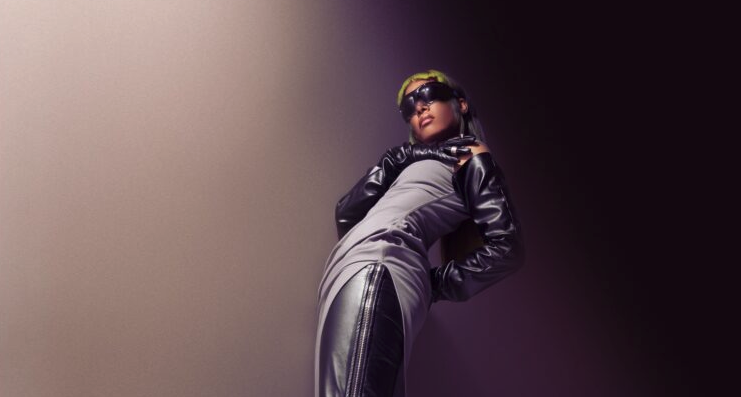Inventing new ways to applaud the maternal figure in your life can come naturally for some and difficult for others. With Second Line, Dawn Richard‘s first full-length album under the Merge Records imprint, she found a way to immortalize the cherished love for her mother Debbie and expand greatly upon their bond in a creative space that brought them closer together. “This [album] created a connection to us that was needed, that we didn’t know we needed,” Richard tells Rated R&B over Zoom.
Richard did something almost similar in 2019 with New Breed, a highly-praised form of music art threaded in her father’s lineage and his connection to the Mardi Gras Indians. Musically, Richard gravitated towards “funk elements and the pop-R&B side” to illustrate the targeted story.
Richard sees Second Line on a much larger scale, creating a parallel between her taste in crossing genre lines and the complexity of a Black woman, particularly her mother. As it relates to the family’s matriarch, Richard is adamant that Second Line holds a greater significance in her discography. This is especially true, considering they’ve had more challenging times in their relationship.
Developing narratives about love, pleasure, power, and unchecked boxes of creativity based on taped commentary with her mother was cathartic. Richard says, “This was an opportunity for us to communicate and see each other in a way that I don’t think we’ve ever seen each other.”
Richard and her mother had a complicated relationship at some point, merely because her mother, like most parents, wants the best for their children. “I think my mom had a very different trajectory for me, and I was always on my own drum — always. That was difficult for her because she had a baby girl, and she saw a different vision for me.”

Richard didn’t detail this ideal course her mother envisioned, but she did expose truths from her mother’s tree of wisdom that she didn’t fully pick and eat from until the Second Line recording. She credits “SELFish (Outro)” as one of the truthful moments where she said she chose “music recklessly,” neglecting the self-care aspect. “I feel like had I been a little bit more aware of self-care, I would not have failed as many times as I did with music.”
In recent years, Richard has seen those so-called failures turn into what she describes as “beautiful rewards.” One of the wins included seeing her first Billboard, presented by Amazon Music, donning Time Square in New York. It was the place where she manifested an enduring career for herself following Making the Band.
The kid got her first billboard in Times Square. The same place i made the band and started by career. No words. Thank you @amazonmusic. And she did it Indie. pic.twitter.com/JfarJYRMSJ
— DAWN (@DawnRichard) April 30, 2021
“It’s a big deal to me because of the full-circle moment. I’ve been in a band, and I’ve been in big moments, and I never had that kind of opportunity. So, I’m just trying to soak it in and not let it pass me by.”
In our conversation with Richard, the fusion artist talks more about Second Line, what else she took from those studio conversations with her mother, how Kaytranada’s historic Grammy win inspired her journey, and more.
Earlier this year, you signed to Merge Records. What about the label’s mission appealed to you as an artist and for the overall album?
I think them being indie is beautiful and special. I knew that I wanted to stay within my indie journey at this time because there were other people who were saying I was being rejected by everybody. I knew that if I did sign with anyone, it would be indie. [But] I was not looking this way. I didn’t think that Merge [Records] would make sense. Now that I look at it and look at their trajectory and really what their story was, it just made so much sense.
Because my story has never been conventional, I’ve been able to make such vast changes within the genres that I’ve done musically. I almost feel like it was meant to work with an indie rock label where I started loving music in the first place. They appreciate the cult following. They pay attention to the detail of a release and understand the dynamic of art in a way that I always have loved to put out my art.
My project was done when I spoke with them. I told them what I wanted to do. It was a beautiful feeling to tell your label, “This is what I want to do.” And then they say, “Okay, let’s do it,” and not have anyone question your Blackness, your femaleness, your message and what you’re trying to portray, but have them rally behind you. Even though it’s still like a smaller thing than what a machine would be, I feel so protected and so held in this process.
What I thought was cool about the promo for Second Line was the many ways you and your team are making this album available to fans and consumers, from streaming to cassette to CD to vinyl.
I wanted to go back to the time when we were excited about releases. Right now, because of social media, we release one song and then we say, “Album coming out tomorrow.” I get that because social media has made things be consumed quite quickly. We’re hungry constantly, eat for five seconds, and then want the next new thing. We get the music video today and then we’re over it. I get that. I never had the pressure of making a hit single or a hit video. I never cared to make that.
As an indie artist, I can’t compete with payola and radio. I just wanted to make great shit. I wanted to put [out] conceptual albums where people have to listen to the album a few times to catch all the different gems being played. Even in the releases, do the same thing. That’s important to me. I want to get back to that time where people got excited for not just the songs but the actual packaging and the lead-off.
In the “King Creole (Intro)” and in the promo surrounding this album, you said, “I don’t need a genre / F*ck it, I am the genre.” Can you elaborate on that line?
Being a Black woman in my journey, I’ve noticed that my color was dictating the sound people were labeling me in — not just me, multiple artists. When you see a Black artist singing folk, we say alternative R&B. When we see our Black girls singing rock music, we say alternative R&B. As soon as we see someone who is Black in a different genre, we immediately try to grab that other side because we can’t fathom that they can’t just sit where they are, and it’d be quite fine there. I didn’t realize that was going to be an issue because I started in a predominantly white girl group and we were pop. I wrote pop records and no one ever questioned it because we were all singing it. The moment I got out of it and was singing the same thing, [my music] wasn’t received the same way.
I would do a dance record, but because I was singing, it was an R&B song. That’s fine but I’m not singing the same thing Jazmine Sullivan is singing. I want to be along with my peers and be seen in all aspects. So when I stated that [line], I wanted it to be clear that before you get on this journey, don’t expect the genre. I want people to hear my music and say, “That’s not a genre, that’s Dawn.” In my legacy, I would hope that I could create something that is more about a sound and less about a genre.
You have a song on Second Line called “Nostalgia.” How were you able to expand upon the past sound of the Black dance culture without repeating the existing work.
I think you do it by intention. You make sure you practice and research. I knew that I wanted to pay homage to those before me because who am I to say that I’m the first? I’m not. Dance music has come from Black culture: Detroit, Chicago, even Bounce music from New Orleans, [New] Jersey, and D.C. go-go music. We could go on and on about what the movement was culturally. Larry Heard was very special to me, as far as what I was listening to. I studied Crystal Waters and Donna Summer and all of these beautiful aspects of disco and sound. What I realized is I found the formula, then I broke up the pieces and said, “Now, what is my sound? Who am I? How do I want to ride this record with that New Orleans thang while still paying homage to those before me?” That’s what nostalgia is. That’s why it’s called “Nostalgia,” so you understand that this future thing started with this Black thing. It’s an opportunity for you to hear a progressive sound against culture.
“Voodoo (Intermission)” contains a soundbite from your mother Debbie that describes a Louisiana woman. One thing that stood out to me in her description was, “She’s not gon’ back down.” What are you not willing to back down for these days?
I’m not willing to back down on choice. I feel like I have pandered a lot with compromise. I think it’s important that you do that, but I never wanted to feel like I don’t have my choice to move in anything that I do — whether it’s a creative choice, love choice, family choice, gender choice [or] sexuality choice. I will not back down from my own choice. I think we don’t realize how much choice is stripped away from us in the work environment, in relationships and in our own families. A lot of times we’re in situations where we feel like we don’t have a choice. It’s like, you want to say this, but you don’t. You sacrifice your choice of views to things for the betterment of someone else. I think that’s beautiful to do, but we have to be careful that we don’t compromise our own choice and happiness in the process. So, I will not back down from my choice.

“Radio Free” seemingly references a woman whose music and artistic dreams have been shut out by executives and unwelcomed on airwaves for various reasons. How do you feel about your art existing primarily in the streaming world without radio support?
I had this conversation with one of the DJs when I did a mix with some incredible gatekeepers and cool DJs in the indie space. [DJ] Tarek talked about how Black radio has dropped the ball in supporting multiple-genre Black artists and how they don’t play them. It’s like we dropped the ball on the opportunity to support across the board culturally. I feel the same way. Culturally, I feel like we have an obligation to support each other in all aspects, even if we don’t like the music. I don’t think we necessarily have a Black radio funnel where we support all different types of genres of Black culture in a mass way.
We are still a part of a formula. I didn’t realize how much radio is force-fed. We are force-fed who we like so much that, even with streaming, we don’t realize we are still consumers and that we are being fed what to like. I think that’s fine but I also think we need to be careful not to starve the other side of us, which is the innovation that needs to be respected and had. So, “Radio Free” definitely came from the sound waves, but it’s bigger. It’s bigger than the music. We have to realize that when everyone shuts you out for your gender, your sexuality, your color, your music, your art, it’s imperative you understand that your freedom can still be loud.
You still have control over your voice. Understand that is power. There’s wealth within your ownership and worth. Take that freedom and make as much power, money and greatness with your self-worth that you possibly can because though the radio cuts off, it doesn’t mean that you can’t be heard. Understand you’re the soundwave. Your frequency can be heard with or without them. There is always a way to get your sound to the world. Always.
Kaytranada recently made history at the Grammys as the first Black person to win Best Dance/Electronic Album. You were excited about his win, and so were others, especially those who said you are up next. What did his win mean to you, and how do you process the fact that fans are rooting for you to be a forerunner next year?
I got chills. I’m always going to celebrate a win for us. I do think it is so sad that it took this long. I’m so happy that we’re acknowledging it. I hope that this will open the flood gates to conversation. Rewards are beautiful, but they also have to be followed by follow-through. I don’t want it just to be the first Black person. I want Black women to be seen more in this place. With every win, we should never look at it as our work is done because we tend culturally to do token people. We get one token Black person, and then we put all our energy to the one Black person, and we forget the other thousands that are still trying to fight for something. I’m so happy that we’re moving a dial, but we do need to continue forth, and I pray that this is only the beginning for our culture within this space.

I know you’re a big advocate of the Black LGBTQIA culture. For a while, exploiting the LGBTQIA influence and prominence has become the new marketing strategy for artists and companies to capitalize on. How do you feel about that?
I think it’s truly sad. I’ve always been an ally of LGBTQIA because if it weren’t for my family, I wouldn’t have a career. Period. Danity Kane. That’s how we started. That was who loved us, that’s who stayed with us, and that’s what our concerts looked like. So it would be shameful for me not to speak on those stories. I support those aspects and I can do my due diligence in that space as an ally. Beyond that, we do need to acknowledge that the way we speak, the way we dress, the way we have TV shows, whatever we do is based on LGBTQIA culture. Until we start paying homage and doing the due diligence to respect you guys in the way that we should, not only capitalizing but paying you guys to be the faces of it and not copy it. Let’s have you be the judges, the faces, the people that win the awards. If you aren’t at the table in all aspects, I feel like our work is not done, and we are doing a shitty job of celebrating in that way. There are moments of greatness like Pose. There are moments of greatness where you have great writers, actors, and everyone in-between [that] comes from the actual aspects of what they should be. But just because we get one doesn’t mean we stop right there.
You officially joined Cartoon Network’s Adult Swim as a creative consultant last summer to help get more Black creators on board for future projects. Are there any projects that you share that you’re excited about bringing to the forefront soon?
Yeah, actually, I saw that Adult Swim was doing a mural project with Atlanta. They were funding three different Atlanta muralists to create a mural to show new talent as artists. When I saw that, I immediately hit them up and said, “You need to be in New Orleans.” So I collaborated with B Mike and Studio B in New Orleans to find three local New Orleans talents. We’ve just picked them out. Two of them are women, and they’re painting their first mural. We’re paying them to create over at Studio B, and we’re going to document it through Adult Swim. So not only am I doing it on the animation series side where we see it on television, for sure. Now I’m bringing it to my city. I’m also bringing it to Black illustrators beyond just animation because not everybody can animate. I am trying to shine a light as much as possible on Black creators. And this was a really cool opportunity to do that. We start in June.
What do you hope listeners have already taken or will take from Second Line?
I want them to have a cathartic experience. I want them to levitate. I want them to feel hope. I want them to feel like this is a calling, especially to people who have ever felt like they didn’t have lanes, spots, spaces. I don’t want us to feel pity and self-hurt. I know all of us, [like] my peers have had horrible stories of being outcast because they came out [or] because they want to be in a certain genre and they don’t feel like they have a place, and they don’t have the money. Wherever the case may be, I want them to know if I can find my own lane and my own space and dance in it, so the f*ck can you. If this album is anything, it is a reflection of the other, the misfit, the kid that never felt like they had a voice. This album is for that person. When you don’t have a world that loves you, you create the world that loves you for yourself. You create your world. That’s what [Second Line] is, a world for those who don’t have a place to dance.

